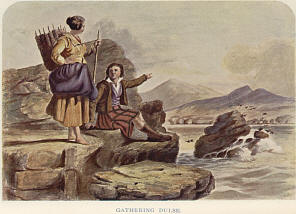
THIS marine production, which grows
in leaves of a deep chocolate colour, over-spreads the sea rocks, from
which it is gathered when the tide recedes, chiefly by women and children,
who carry it home in creels, Croid-hleagan, as represented in the
illustration, or in a smaller sort borne under the arm, called Murlan.
The Dulse of the low country is the
Gaelic Duilasg, the Dulisc of the Irish, and the Fucus palmatus of
naturalists.
When freshly picked and washed it is
an agreeable and wholesome article of food, and is in perfection when it
has been "three times bathed in the May flood." The Ollamh Mhaolich,
or the celebrated doctor of Mull, held this production in high estimation,
and a saying of his is preserved, which intimates that did the people know
its excellence they would gather it from the rocks as if their nails were
like iron. It is much improved when intermixed with a small pungent plant
called pepper dulse the fucus primatifidus. Some prefer it dipped in
scalding water, and we have had it roasted with a hot poker, but when
properly boiled it forms a rich, gelatinous sort of soup, a piece of
butter being added to it, and seasoning according to one’s means or taste,
in which state it may be preserved for some time. It is at times boiled
with milk, or a mixture of cream is added when served up, by which it is
much improved.
Slaik is another marine plant, less
abundant than dulse, which is used in a similar manner. The leaves are
transparent, of a brown colour, and being of so extremely delicate a
texture, they are dissolved in boiling into a beautiful jelly, in the
preparation of which some old dames are very nice. Dulse is regularly sold
in the northern towns, and women attend the markets from great distances,
with heavy loads in creels slung on their backs.
The severity of the climate in the
Highlands of Scotland is in many seasons exceedingly great, subjecting the
natives to frequent painful privations, the poorer cottars, from their
situation, being often reduced to utter want on the failure of their
little crops. The temperature is not so excessively low, being mollified,
especially in the islands and along the coasts of the mainland, by the
ocean; but the country is subject to long-continued winds and rains, which
with the early insetting of winter and the late advance of spring,
frustrate the labours of the industrious farmer and leave him in sad
destitution.
Of late years, and at the present
time, this is lamentably the case with the hardy population of these
parts, whose patient endurance of their sufferings is worthy of the
highest praise, and if we do not read of such dire calamities as famine
and consequent disease ravaging the Highlands in former ages, we must
conclude that under the patriarchal rule of clanship the people were saved
by the chiefs, their natural protectors, from such a fate, being provided
for when in distress by them and their more fortunate friends, and
assisted through their difficulties by the fraternal co-operation of the
clan.
The social state of the Gaël is now
very different, and it is unfortunately found that they can no longer live
with comfort, or even without the frequent occurrence of periods of
starvation in their native land. Emigration is the political panacea for
both their own distress and the burden of their support thereby thrown on
the lairds. The solitude of sheepwalks, hunting grounds, and forest
preserves, are already more commonly seen than the cultivated fields and
grazings of the tenantry, and the destruction of that class, never to be
restored—" a bold peasantry, their country’s pride,"—cannot be averted;
sic tempora mutantur
in the progress of society—the Highlanders have
outlived their pristine state, and must yield to changes not to be eluded.
Tenaciously have they clung to their fathers’ institutions, delighting in
the recollection of a system no longer in existence.
The wars, for which they were so
useful in the British armies, opportunely met their wonted feelings and
habits; but even now when these are legally subverted, they have not been
able, generally speaking, to adapt themselves entirely to the wide
alteration of their circumstances. The philosopher and patriot may regret
this melancholy change, but the Highlander’s fate appears inevitable.
When a people are visited with want
of food, what expedients will be resorted to for alleviation of the pains
of hunger! In the late periods of destitution, old and young resorted
daily to the rocks of a stormy ocean as the only source, whence they
strove to pick the means of life; but, truly, much may there be found to
serve for human food, and of no inferior sort. Besides the dulse and slaik,
there are wilks, limpits, mussels, oysters, crabs, etc. Of the first an
excellent and substantial broth is made, with the addition of butter, and,
at times, oatmeal. Groups of children are often seen around a fire kindled
among the rocks, broiling the shell fish which have just been taken from
their oozy bed, rejoicing at their humble feast, and furnishing pleasing
subjects for the artist.

